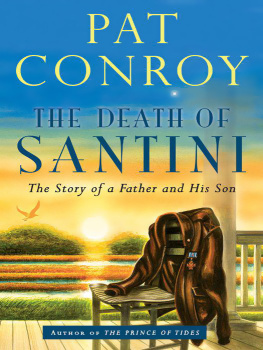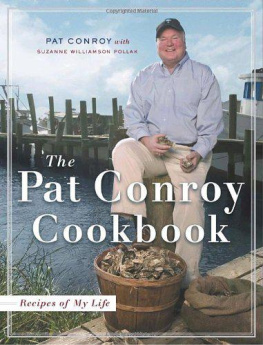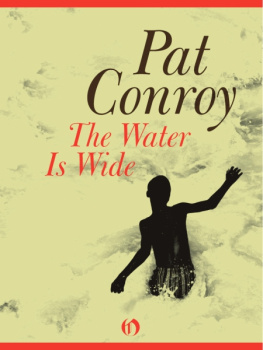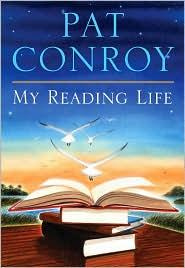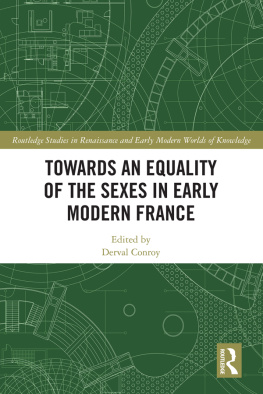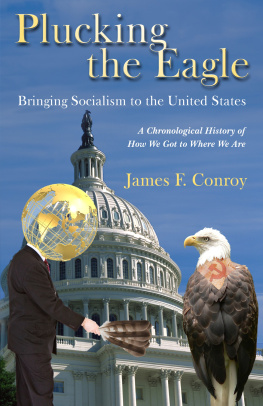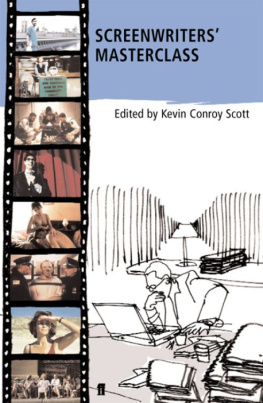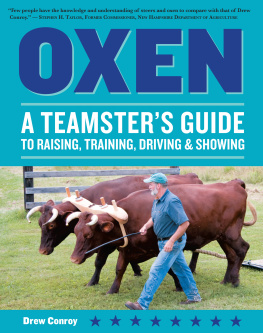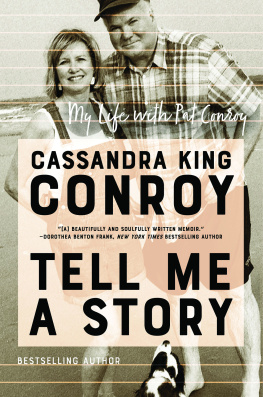Pat Conroy - Pat Conroy Cookbook
Here you can read online Pat Conroy - Pat Conroy Cookbook full text of the book (entire story) in english for free. Download pdf and epub, get meaning, cover and reviews about this ebook. year: 2004, publisher: Knopf Doubleday Publishing Group, genre: Home and family. Description of the work, (preface) as well as reviews are available. Best literature library LitArk.com created for fans of good reading and offers a wide selection of genres:
Romance novel
Science fiction
Adventure
Detective
Science
History
Home and family
Prose
Art
Politics
Computer
Non-fiction
Religion
Business
Children
Humor
Choose a favorite category and find really read worthwhile books. Enjoy immersion in the world of imagination, feel the emotions of the characters or learn something new for yourself, make an fascinating discovery.

- Book:Pat Conroy Cookbook
- Author:
- Publisher:Knopf Doubleday Publishing Group
- Genre:
- Year:2004
- Rating:5 / 5
- Favourites:Add to favourites
- Your mark:
- 100
- 1
- 2
- 3
- 4
- 5
Pat Conroy Cookbook: summary, description and annotation
We offer to read an annotation, description, summary or preface (depends on what the author of the book "Pat Conroy Cookbook" wrote himself). If you haven't found the necessary information about the book — write in the comments, we will try to find it.
Pat Conroy Cookbook — read online for free the complete book (whole text) full work
Below is the text of the book, divided by pages. System saving the place of the last page read, allows you to conveniently read the book "Pat Conroy Cookbook" online for free, without having to search again every time where you left off. Put a bookmark, and you can go to the page where you finished reading at any time.
Font size:
Interval:
Bookmark:
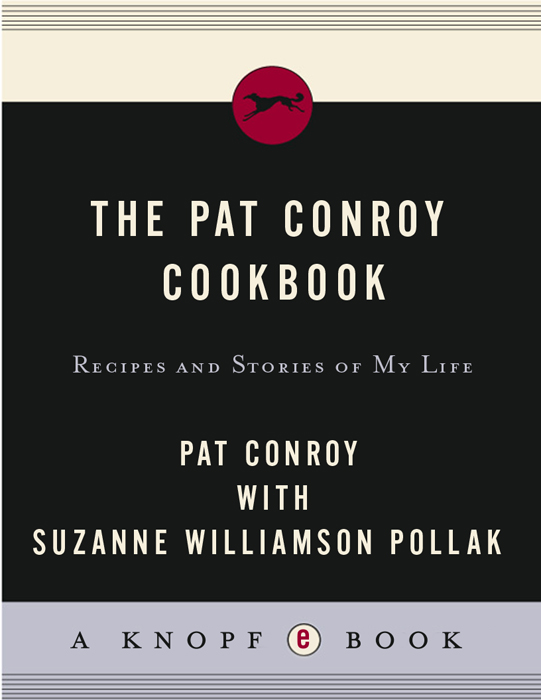
The Boo
The Water Is Wide
The Great Santini
The Lords of Discipline
The Prince of Tides
Beach Music
My Losing Season
South of Broad
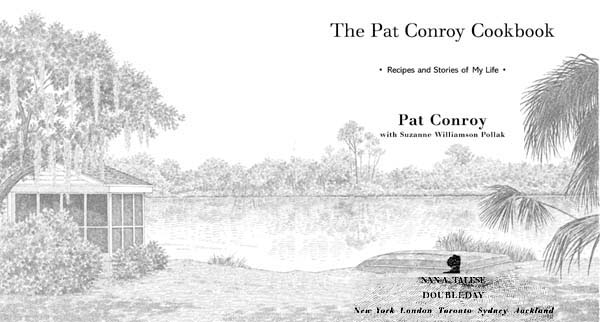
This book is dedicated to the cooking partner of my life,
Cassandra King
I would like particularly to thank Jennifer Josephy, the superb editor of Doubleday/Broadways excellent line of cookbooks, for her guidance through this project. Without her, my longtime editor, Nan A. Talesewho is all right with words but hardly an expert on foodwould have been lost.
INTRODUCTION
I Encounter Escoffier
CHAPTER ONE
CHAPTER TWO
CHAPTER THREE
CHAPTER FOUR
CHAPTER FIVE
CHAPTER SIX
CHAPTER SEVEN
CHAPTER EIGHT
CHAPTER NINE
CHAPTER TEN
CHAPTER ELEVEN
CHAPTER TWELVE
CHAPTER THIRTEEN
CHAPTER FOURTEEN
CHAPTER FIFTEEN
CHAPTER SIXTEEN
CHAPTER SEVENTEEN
CHAPTER EIGHTEEN
CHAPTER NINETEEN
CHAPTER TWENTY
CHAPTER TWENTY-ONE
CHAPTER TWENTY-TWO

T he subject of food is nearly a sacred one to me. It never surprises me when I read stories about the ancients sacrificing animals and bringing plates of fruit and the produce of their fields to appease the anger of their restless gods. My passion for eating springs from a childhood not deprived of food, but deprived of good food. My mother thought cooking was a kind of slave labor that involved women having too many children. She looked upon food as a sure way to keep her family alive, and it did not occur to her until late in life that one could approach a kitchen with the same intensity as an artist nearing a canvas. To Peg Conroy, the kitchen was a place of labor, not a field of fantasy and play.
Though I grew up living along the Eastern seaboard, my mother never served fresh fish at her dinner table, even if I had caught and cleaned them myself. Since we were a Roman Catholic family (the oddest thing, by far, a human being could aspire to in the South before the Hare Krishnas turned up at the Atlanta airport), we were under a religious injunction not to eat meat on Friday. Anytime I would come into the house with a string of fish, my mother would hold her nose and say, Get those smelly things out of my house this minute, young man.
My mother could not have been more upset if I had brought roadkill newly scraped off a highway into her kitchen. Perhaps Peg Conroy carried some bad experience with a fish into her adult life, like a bone lodged in her throat. Wherever her aversion to fish began, she solved the Friday problem by serving frozen fish sticks to her large, rowdy family for the approximately five hundred Fridays of my childhood. My youngest brothers thought that fish were rectangular in shape for the longest time. My brother Mike still prefers a fish stick to a salmon steak.
I did not taste fresh shrimp until I got to Beaufort, South Carolina, late in high school, yet I lived around inlets and rivers teeming with schools of shrimp swarming in their measureless fecundity. Each fresh tide brought shoals of white shrimp boiling into the creeks a hundred yards from the house where my mother heated up their frozen cousins.
But even my mother could not grow up in the South without accruing several specialties that she could render with casual mastery. She made corn bread that could not be improved upon. I can still smell her apple and peach pies cooling on the windowsills of our house on Spencer Avenue in New Bern, North Carolina. Her lemon bisque made her famous in whatever neighborhood we settled in during my much-traveled boyhood. Those she made by rote, out of a sense of duty. She took little joy from those mouthwatering recipes she had brought to her marriage. It saddens me that my mother never achieved any satisfaction from the kitchen, where she spent so much of her time dreaming of being elsewhere. I loved her grits and biscuits, and her fried chicken was so wonderful that I have spent much of my life searching for that piece of fried chicken which will provide the soul-stirring satisfaction of my mothers recipe.
But let it be said, my mother was not a gifted cook and never aspired to be one. She collected some recipes because, I think, she heard that was one of the things young wives did during the era in which she grew up. The table she set never contained surprises or those moments of ecstasy when some experiment she had wrought in her oven was brought to the table in triumph. My mother looked upon food as a necessity, not a realm of art.
When I wrote my book The Prince of Tides, I made the shrimpers wife, Lila Wingo, one of those Southern cooks who went to the kitchen with her passionate nature ablaze. By then, I thought about cooking the way I thought about writing. I had come to cooking by accident, and it was one of the strangest events in my life when I found myself before a stove with three daughters wandering around me fully expecting that I would feed them before I put them to bed.
When my first wife, the fetching Barbara Bolling, entered Emory University Law School, she pointed to the kitchen and told me from that day on I would be responsible for cooking the evening meal for the family. This seemed fair enough to me, but it contained the seeds of both disaster and high comedy. My mother had not taught her oldest son how to cook an egg, much less a full-bodied meal that would not cause rickets or beriberi among my feisty daughters. I have absolutely no recollection of how I kept myself alive from the time I graduated from The Citadel until 1969, when Barbara and I married. Certainly, I carry no memory of standing over a stove cooking something perfectly wonderful for dinner. Mostly I remember heating up things.
But with my first dinner in view, I drove to the Old New York Bookshop in midtown Atlanta to ask my friend Cliff Graubart for help. There was no book in the world that Cliff could not find for me and his spirit was generous and open-minded.
I need a cookbook, Cliff, I said when I entered his store.
Why? Cliff asked.
Im in charge of feeding my family the evening meal from now on, I answered. Barbara starts law school next week.
Im going to miss Barbara, Cliff said. Starving to death is a tough way to die. And I cant sit by and let you kill your kids.
Cliff pretended to dial three numbers on his phone, then said to an imaginary speaker: Hello, nine-one-one, Id like to report an incident of child abuse out on Briarcliff Road.
Very funny, I said. You know of a good cookbook?
Cliff thought for a moment and said, I hear Escoffiers is good.
I walked out of Cliffs store with a copy of Auguste Escoffiers cook-book in my hand. It is not a manual I would encourage the first-time cook to turn to, but its purchase was a life-changing event. For a single year I used only recipes from Escoffiers great text. My family and friends raved about my cooking talents, and a passionate amateur was born in that kitchen on Briar cliff Road. I made the thrilling discovery that if I could read and follow directions, I could cook. If I discovered a fabulous recipe, I could prepare a terrific and praiseworthy dish. I could feed people well, and they would love me for it and sing my praises to friends and neighbors. Because of Emory Law School, I discovered an avocation as an amateur cook of some distinction, and I find that fact miraculous. The love of cooking is a portable, moving pleasure that I take with me into every house or country I enter. When other cooks ask me who taught me how to cook, I always say, without irony, Auguste Escoffier was my first instructor. He was the hospitable maitre d who led me by the arm and introduced me to the limitless world of cuisine. Because of him, I was a French cook before I was an American one.
Font size:
Interval:
Bookmark:
Similar books «Pat Conroy Cookbook»
Look at similar books to Pat Conroy Cookbook. We have selected literature similar in name and meaning in the hope of providing readers with more options to find new, interesting, not yet read works.
Discussion, reviews of the book Pat Conroy Cookbook and just readers' own opinions. Leave your comments, write what you think about the work, its meaning or the main characters. Specify what exactly you liked and what you didn't like, and why you think so.

